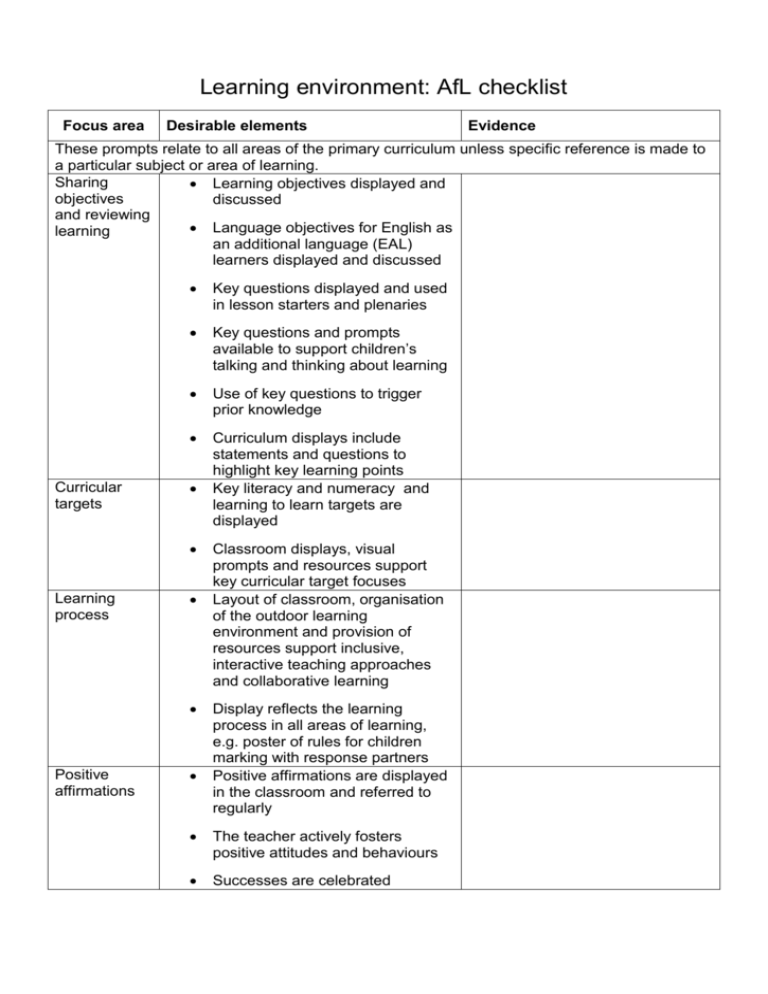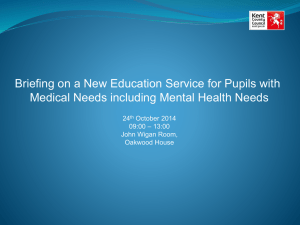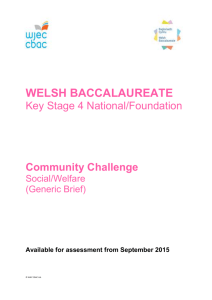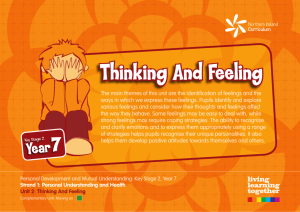AfL Learning Environment Checklist for Primary Education
advertisement

Learning environment: AfL checklist Focus area Desirable elements Evidence These prompts relate to all areas of the primary curriculum unless specific reference is made to a particular subject or area of learning. Sharing Learning objectives displayed and objectives discussed and reviewing Language objectives for English as learning an additional language (EAL) learners displayed and discussed Curricular targets Key questions displayed and used in lesson starters and plenaries Key questions and prompts available to support children’s talking and thinking about learning Use of key questions to trigger prior knowledge Curriculum displays include statements and questions to highlight key learning points Key literacy and numeracy and learning to learn targets are displayed Learning process Positive affirmations Classroom displays, visual prompts and resources support key curricular target focuses Layout of classroom, organisation of the outdoor learning environment and provision of resources support inclusive, interactive teaching approaches and collaborative learning Display reflects the learning process in all areas of learning, e.g. poster of rules for children marking with response partners Positive affirmations are displayed in the classroom and referred to regularly The teacher actively fosters positive attitudes and behaviours Successes are celebrated Aspects of learning – definitions Enquiry These skills enable pupils to ask relevant questions, to pose and define problems, to plan what to do and how to research, to predict outcomes and anticipate responses, to test conclusions and improve ideas. (National Curriculum, 2000) Problem solving The key skill of problem solving involves pupils in developing the skills and strategies that will help them to solve problems they face in learning and in life. Problem solving includes the skills of identifying and understanding the problem, planning ways to solve a problem, monitoring progress in tackling a problem and reviewing a solution to a problem. (National Curriculum, 2000) are thinking and what they are feeling. They use this understanding to organise themselves and plan their learning. Managing feelings In managing feelings, children use a range of strategies to recognise and accept their feelings. They can use this to help regulate their learning and behaviour – for example, managing anxiety or anger, or demonstrating resilience in the face of difficulty. Motivation Motivation enables learners to take an active and enthusiastic part in learning. Intrinsically motivated learners recognise and derive pleasure from learning. Motivation enables learners to set themselves goals and work towards them, to focus and concentrate on learning, to persist when learning is difficult and to develop independence, resourcefulness and personal organisation. Creative thinking These skills enable pupils to generate and extend ideas, to suggest hypotheses, to apply imagination, Empathy and to look for alternative innovative outcomes. Being able to empathise involves understanding (National Curriculum, 2000) others and anticipating and predicting their likely thoughts, feelings and perceptions. It involves Information processing seeing things from another’s point of view and These skills enable pupils to locate and collect modifying one’s response, if appropriate, in the relevant information, to sort, classify, sequence, light of this understanding. compare, contrast, and to analyse part/whole relationships. Social skills (National Curriculum, 2000) Social skills enable children to relate to others, take an active part in a group, communicate with Reasoning different audiences, negotiate, resolve differences These skills enable pupils to give reasons for opinions and actions, to draw inferences and make and support the learning of others. deductions, to use precise language to explain Communication what they think, and to make judgements and The key skill of communication includes skills in decisions informed by reasons or evidence. speaking, listening, reading and writing. Skills in (National Curriculum, 2000) speaking and listening include the ability to speak effectively for different audiences; to listen, Evaluation understand and respond appropriately to others; These skills enable pupils to evaluate information, and to participate effectively in group discussion. to judge the value of what they read, hear and do, to develop criteria for judging the value of their own Skills in reading and writing include the ability to read fluently a range of literary and non-fiction and others’ work or ideas, and to have confidence texts and reflect on what is read; and the ability to in their judgements. write fluently for a range of purposes and (National Curriculum, 2000) audiences, including critical analysis of their own and others writing. Self-awareness (National Curriculum, 2000) Self-awareness enables children to have some understanding of themselves. They know how they learn, how they relate to others, what they




![afl_mat[1]](http://s2.studylib.net/store/data/005387843_1-8371eaaba182de7da429cb4369cd28fc-300x300.png)




